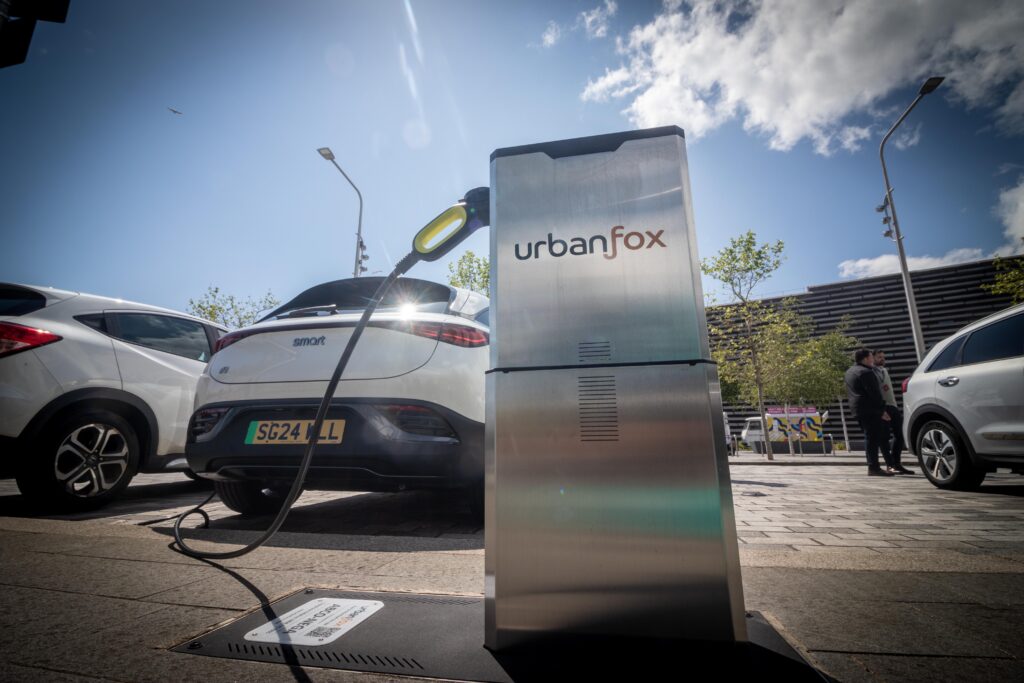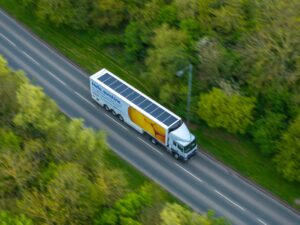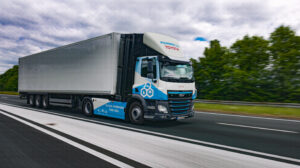Dundee City Council has created world-class charging hubs for public and private use. FVI Editor Ann-Marie Knegt travelled to Dundee for the launch of the new Urban Fox retractable charging point and spoke to Dundee’s Corporate Fleet and Infrastructure Manager Fraser Crichton about making the city fully electric.
Dundee City Council is one of the most progressive local authorities in the world regarding the implementation of electric charging infrastructure. In 2016, Dundee became Scotland’s only OLEV (Go Ultra Low) city, marking the start of the city’s provision of comprehensive and innovative EV charging infrastructure built by Dundee Council’s subcontractor Evolt Charging.
The UK Government is banning the sale of all new petrol and diesel vehicles by 2035 in England and Wales. In Scotland, all new petrol and diesel cars and vans will be phased out five years earlier by 2030. This is part of the Scottish government’s efforts to create a cleaner, healthier, greener Scotland.
Dundee has a population of approximately 150,000 people spread over a tiny 60 square km area. More than half of residents do not own a driveway. ‘To meet the decarbonisation targets set by the Scottish Government, we must put a suitable infrastructure in place,’ says Fraser Crichton, Dundee’s Corporate Fleet and Infrastructure Manager. ‘We looked at three areas, including the council depot charging infrastructure, the multi-storey car park infrastructure, and the city’s inner ring.’
Fraser describes the energy planning process as a jigsaw puzzle. ‘You can’t look at things in isolation. We are not just dealing with individual pieces but combining elements to create a comprehensive and sustainable solution. This requires solid partnerships and a deep understanding of Dundee’s unique charging needs.’
The charging solution had to be resistant to vandalism and damage because the city had previously had significant problems with on-street chargers. ‘We also needed a slow charging solution that wouldn’t overburden the grid.’
After considerable research, Dundee partnered with Urban Fox, a collaboration between Balfour Beatty Investments and Urban Electric Networks, to install the UEone charger. This is Europe’s first fully retractable electric vehicle charger, designed to prevent vandalism and to keep road surfaces clear and uncluttered when not in use.
Following over seven years of development and a two-and-a-half-year trial, Urban Fox has installed 18 new Mk5 UEone chargers across nine locations in Dundee. These 7kW on-street charge points rise from the ground to an accessible height and auto-retract when not in use, leaving pavements free and more accessible to pedestrians. By downloading the Urban Fox app, members of the public can control the UEone, power their EV, and track usage.
Dundee City Council now owns four public rapid charging hubs, three multi-storey car parks with EV chargers, and 18 pop-up chargers. In total, there are 400 charge points in the city, and the council owns 215 of these. In 2023, more than 135,000 charging sessions were conducted in Dundee, with 3,6232,781 kWh consumed. More than a third of the taxis in the city are now electric.
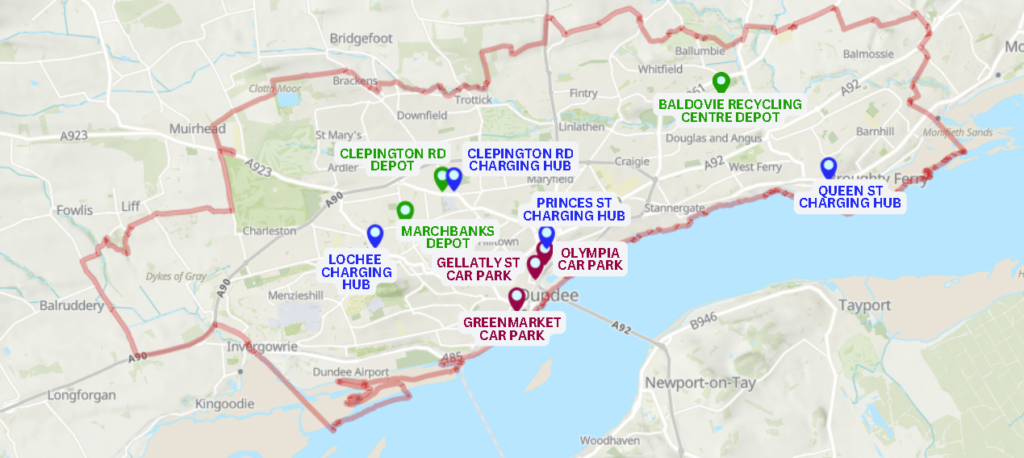
Fraser is now focusing on new charging infrastructure projects, each with its own challenges. The council is installing charging infrastructure in Braeview Academy and Craigie High School, which will cost around £100 million. This includes air-source heat pumps and solar panels throughout the schools and charge points in the car parks.
Dundee’s Bell Street Car Park is at the start of its £17 million levelling up project and will be converted into the Bell Street Green Travel Hub. Alongside newly developed commercial space, the hub will provide parking and electric charging points for 350 vehicles on its remaining floors. The roof will be fitted with solar panels that Dundee hopes will produce enough energy to sell the excess back to the grid. The bottom floor will house e-bike charging as it is on a cycle route between Abertay University and Dundee University. ‘We have a very young population in Dundee. Young people get our sustainability drive.’
Marchbanks Depot
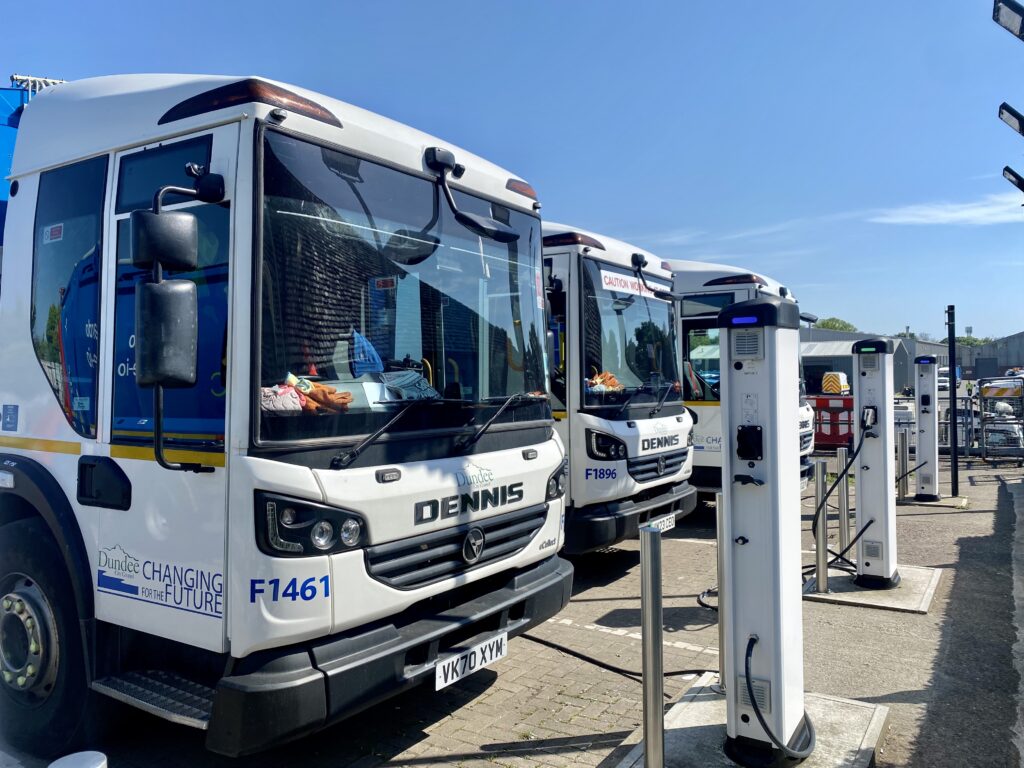
Dundee’s existing fully electric RCVs – eight Dennis Eagle eCollects – are stored and charged at Marchbanks Depot. Typically, these are single shifted. In the summer, says Fraser, they return with about a quarter of the charge left, which reduces by around 15% in the winter. He says that the vehicles can manage around 1,500 bins daily, but the council’s longest route only has 1,300 bins.
From an air quality perspective, one diesel RCV produces emissions equivalent to those of about 20 to 25 cars. Each electric refuse vehicle reduces the council’s diesel consumption by about 1%, so Dundee currently saves 8% on diesel yearly.
‘To make the public aware of what we’re doing, we asked school children to name the RCVs. The traction this initiative achieved was unbelievable. Everyone is aware and happy that our refuse collection vehicles are fully electric.’
Evolt has built the charging infrastructure for the new salt dome next door to the depot. ‘The far side of the roof is solar panelled, which feeds the Tesla battery storage, which in turn feeds our vehicles,’ says Fraser. ‘It’s not enough to power our entire fleet – we have over 200 units – but it considerably reduces how much power we draw from the grid. As we also need energy for maintenance, we have covered the entire roof of our garage with solar panels as part of a holistic strategy.’
Dundee is six years into its electrification project, and Fraser says it is having an impact through reduced maintenance and servicing. ‘The cost of servicing has decreased by about 20% compared to our previous diesel vehicles. The eCollects don’t have the same harsh start and stop as the former fleet, and the transmission is much smoother.’
The refurbished Baldovie Depot on the other side of the city will house 15 new electric RCVs powered by two large wind turbines. Fraser emphasises that putting in the charging infrastructure is a lot of work, but it ultimately reduces the running cost of electric vehicles. Evolt, the council’s current electric charging infrastructure provider, which also built the charging infrastructure for the Marchbanks depot, is building the charging infrastructure for the depot and subcontracting it. Absolute carries out all the solar panel work, while Connected Energy handles the battery storage.
Currently, the council produces an excess of energy in the summer. To better understand how much each site generates and enable the council to determine whether it is more advantageous to sell surplus electricity back to the grid or to charge its electric fleet, Fraser has appointed a company to survey the sites.
‘For example, we have an elite sports centre equipped with 26 heat pumps and roofs covered in solar panels. I can guarantee that we only need about a third of the panels to power the building so what do we do with the rest of the surplus energy? We sell it back to the grid. There is so much value in electrifying the city. We improve the air quality while capturing revenue opportunities.’
Clepington Road Charging Hub
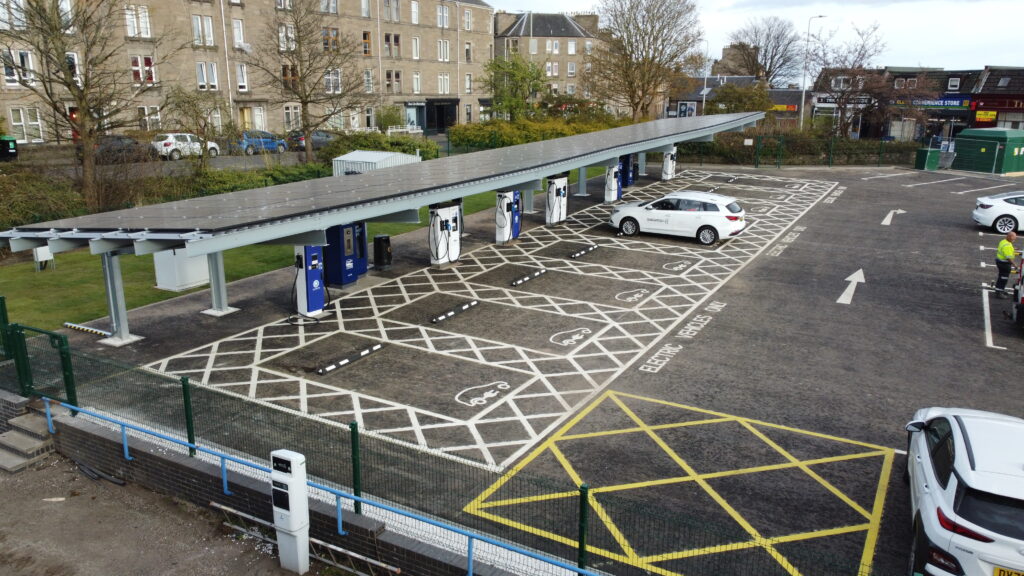
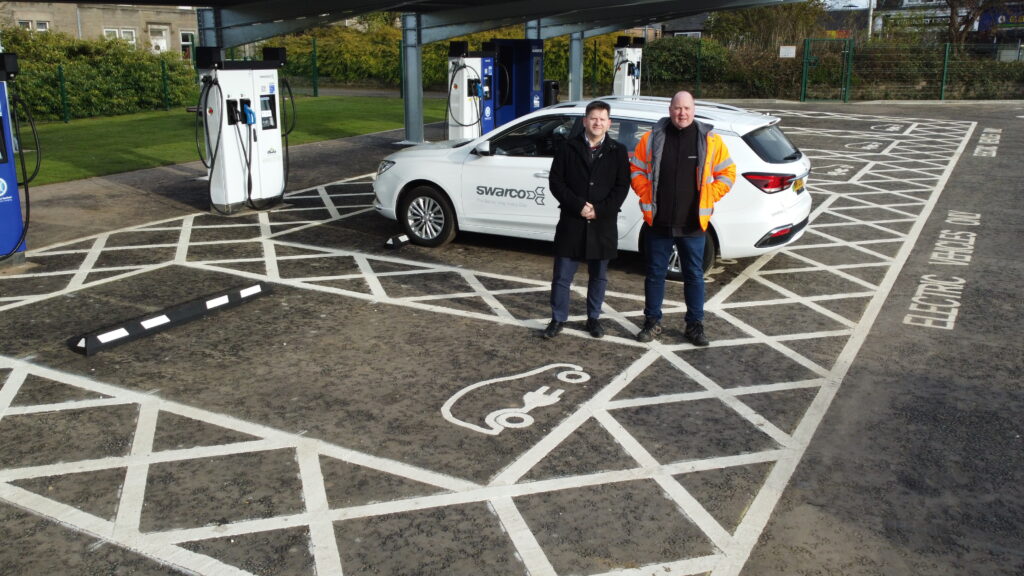
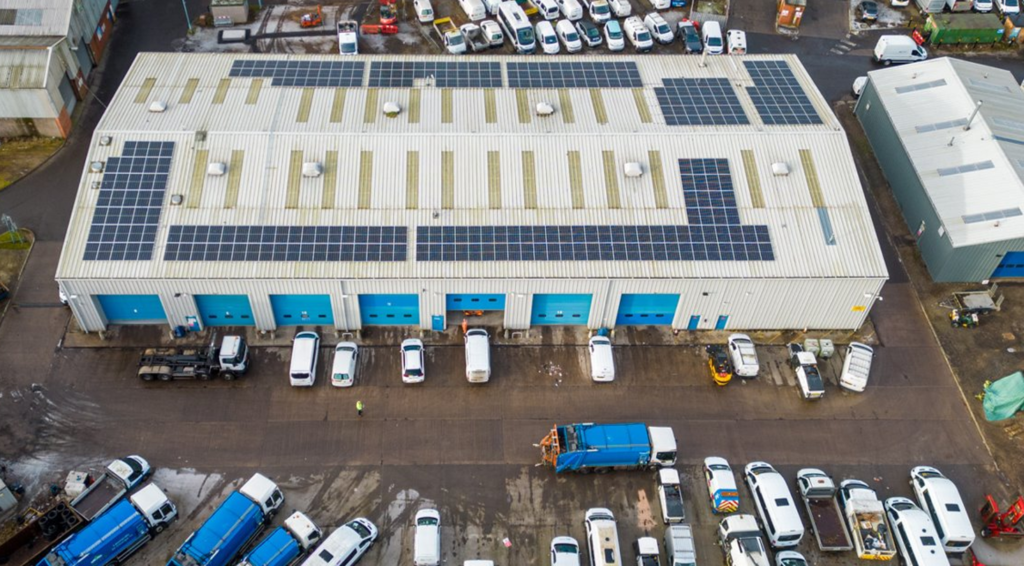
The Clepington Road Charging Hub consists of two charging hubs, one for the public and one for over 200 electric vans that Dundee City Council operates.
The public charging hub consists of nine bays. It has been designed to provide full disabled access after Dundee and its consultancy Urban Foresight realised that most petrol stations do not cater to the needs of disabled users. Features at the new public charging hub include bump stops on charge points to allow wheelchair access, longer pull-out cables positioned lower on units, and reduced glare lighting.
The canopy above the charging station is covered with solar panels, and the roof also captures water, which goes into a unique filtration system to provide drinking water for people to fill their water bottles. Fraser hopes to install this filtration system on every hub in Dundee in the future. There are also two digital advertising screens fitted onto the drinking water stations, which can be used for council messages or to generate additional revenue.
‘The Clepington Road Hub has not only been good for the council, but it has also benefitted local food businesses,’ says Fraser. ‘The kebab shop opposite the road has done a stellar trade since we built this facility. We now have to empty the bins every weekend because they get filled up so quickly with food wrappers. So, this set-up also encourages people to use local businesses.’
Fraser adds that Dundee wants to install another 125 on-street chargers over the next few years and replace a further 30.
‘There is an excellent football club in Dundee called Dundee United and another club called Dundee on the same street. Every Saturday for nine months of the year, people drive to those stadiums on Clepington Road. Chargers around those two locations mean guaranteed revenue for the council. This is the type of strategic thinking that councils in the UK need to embrace. Install chargers where they will generate the most revenue. We must ensure we are encouraging private industry.’
The council’s charging hub on the other side of the site has 28 depot chargers altogether, where Fraser can charge his fleet vans. Two are 50kW, and one is 100kW, enabling the security of a rapid charging capability if required. Battery storage at the site consists of two second-life batteries from Nissan Leafs, providing 600 kWh of energy storage. If the grid goes down, this will act as an emergency backup for the city fleet. The office complex next to the hub will also be rebuilt, and Fraser is now looking for a way to create a sustainable power solution for the buildings.
Dundee’s charging infrastructure
Public chargers
Lochee Charging Hub
Clepington Road Charging Hub
Broughty Ferry: Queens Street Charging Hub
Princes Street Charging Hub
Depot charging hubs
Clepington Road Depot
Marchbanks Depot
Baldovie Depot (in construction)
Car park charging hubs
Gellatly Street Car Park
Olympia Car Park
Greenmarket Car Park

